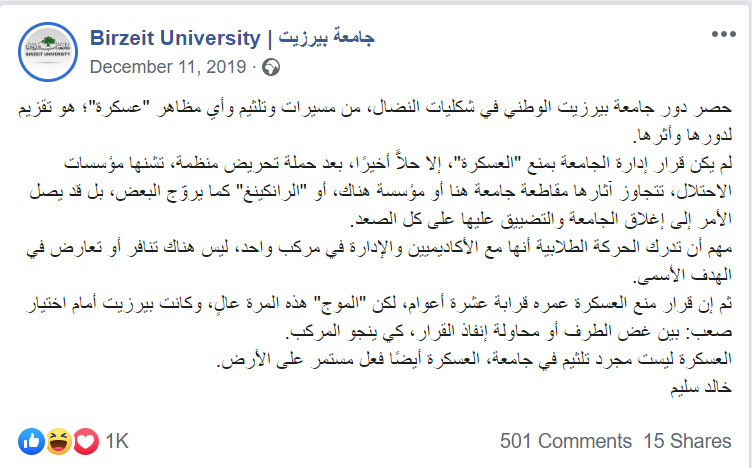Birzeit University faculty member regrets militarization ban
 Text posted on the Birzeit University Facebook page
Text posted on the Birzeit University Facebook page
Posted text: “The diminishment of national Birzeit University’s role in the visual aspects of the struggle, such as processions, masking faces, and other expressions of militarization – is nothing but a diminishment of its role and influence.
The university administration’s decision to ban ‘militarization’ was a last resort, after an organized incitement campaign by the occupation’s institutions, whose consequences would not only be boycotting a university or institution here or there… but is also liable to reach the closure of the university or its harassment at all levels.
The student movement must understand that it is together with the faculty lecturers and the administration on the same side…
The decision to ban militarization is about a decade old, but in this case the ‘wave’ is high, and Birzeit stood before a difficult choice: to ignore it or to try and save the decision (i.e., to implement the ban on militarization) in order to save the ship.”
Students at Birzeit University protested in December 2019 and January 2020 over the cost of tuition and other financial matters, and over the university’s ban on military expression on campus, leading the university to suspend classes. According to Birzeit University Vice President Ghassan Al-Khatib, students violated the university’s policy by “marching in military uniforms or clothing (kufieh) [parentheses in source, i.e., Arab headdress] symbolizing the Palestinian struggle, and by displaying cartoon models depicting resistance weapons and tools.” [Al-Monitor, Dec. 30, 2019]
The university’s ban has existed for years; Birzeit University Dean of Advanced Degrees Mahdi Arar said: “Years ago, the student blocs signed a charter of honor [under which they] refrained from all types of militarism at the university." [Alaraby.co.uk, Dec. 11, 2019]
However, its recent strict implementation is apparently based on pressure from Israel and foreign donors, as noted by various university faculty members. “University Employee Union Secretary Sameh Abu 'Awwad explained: ‘The university is subject to pressure from the occupation... and from donors who are yielding to its dictates’ … He added that, in recent years, some countries had already stopped funding the university, and others were threatening to do so.” [Alaraby.co.uk, December 16, 2019]
The protest ended on Jan. 9, 2020, with an agreement between the university administration and student council. Its first nine clauses discussed tuition and other financial matters, and the tenth and last clause noted in a general manner that other issues will be discussed.